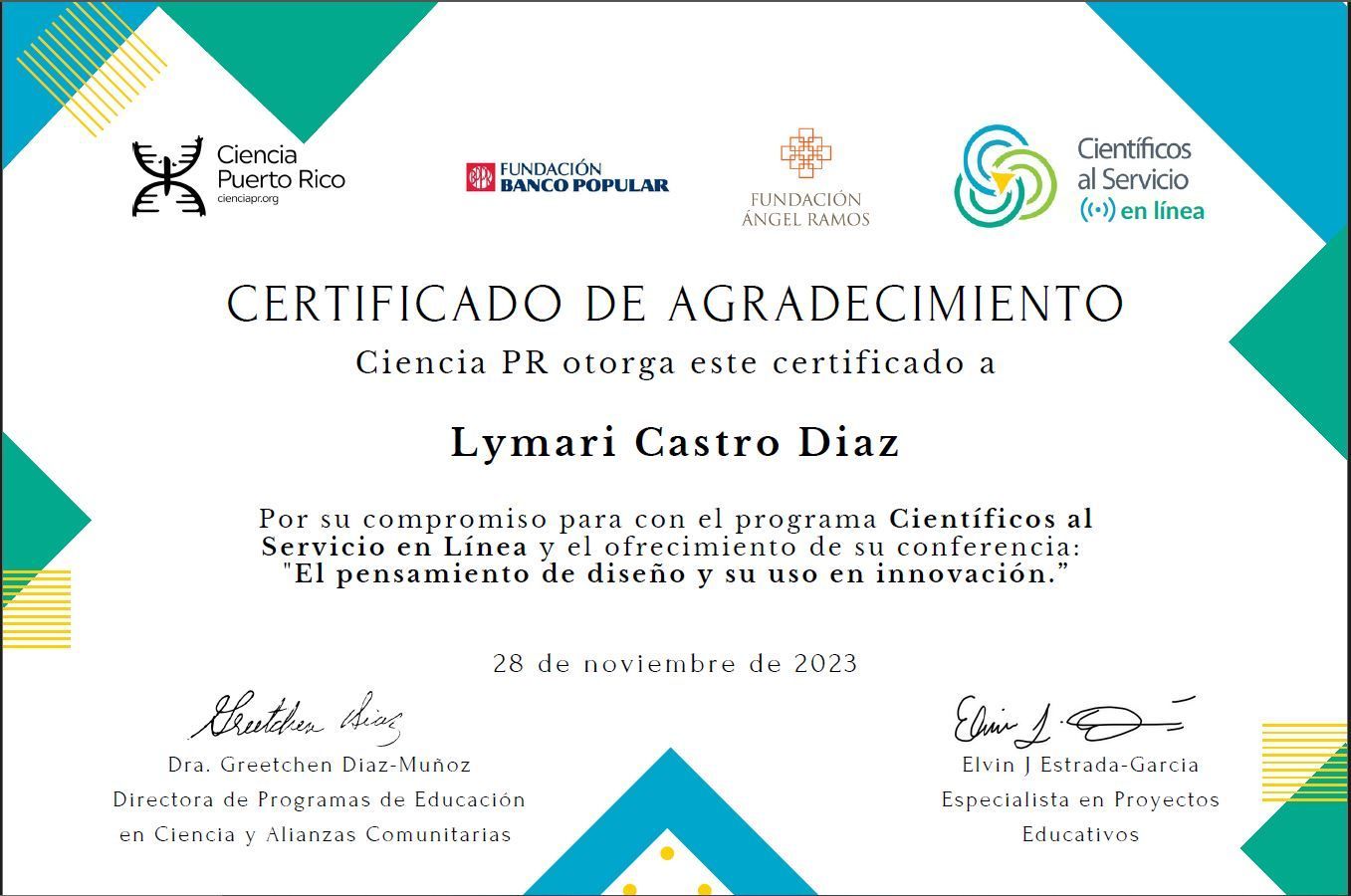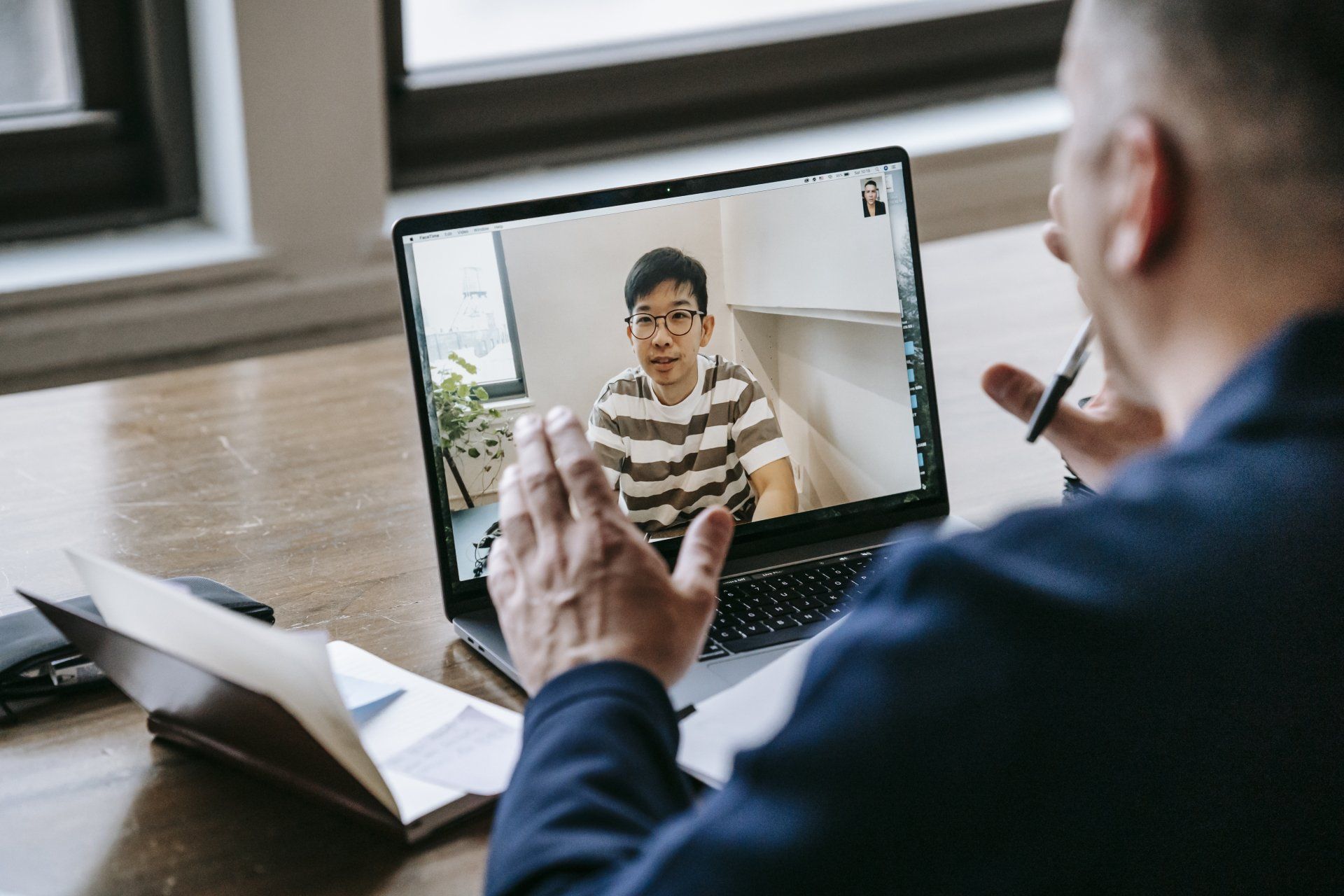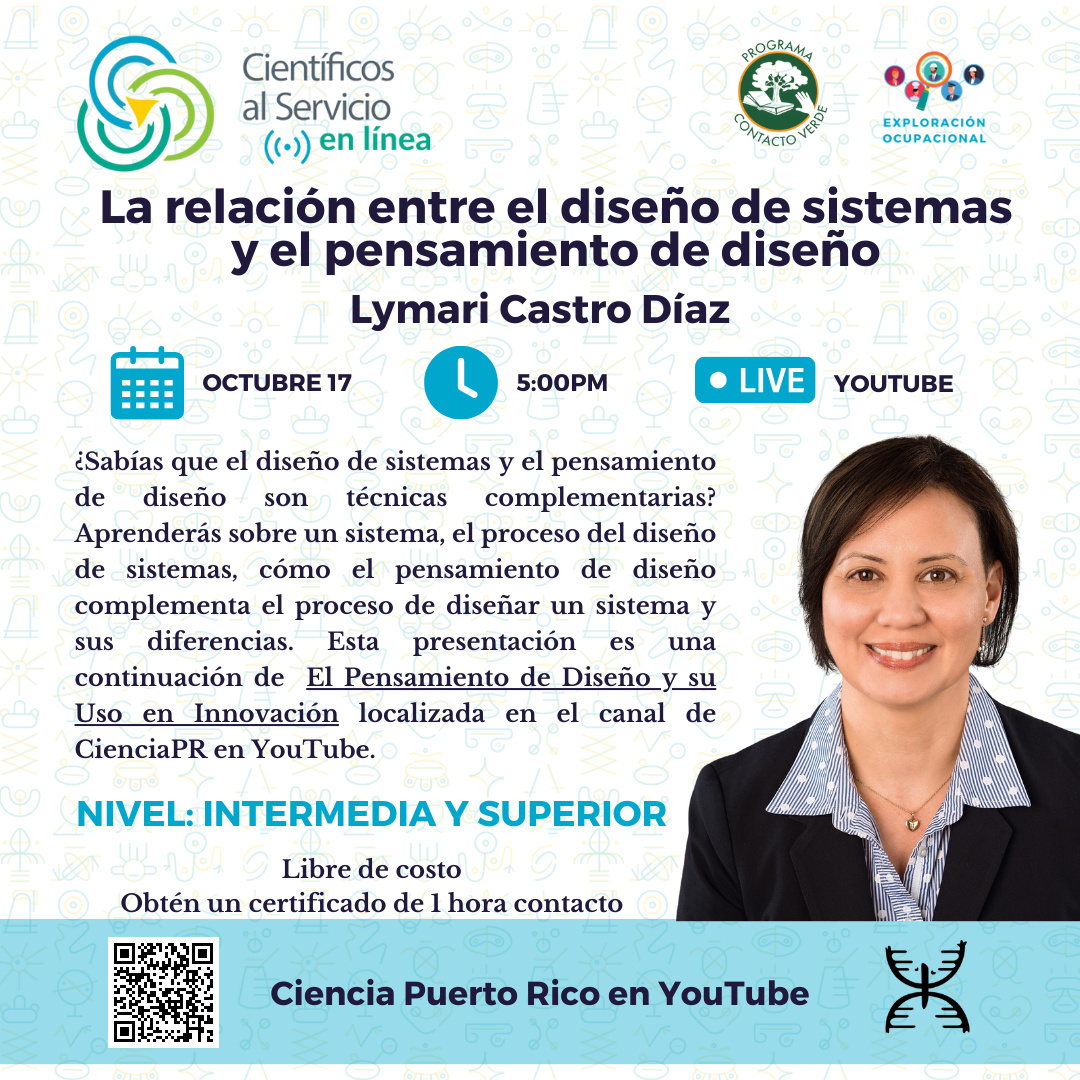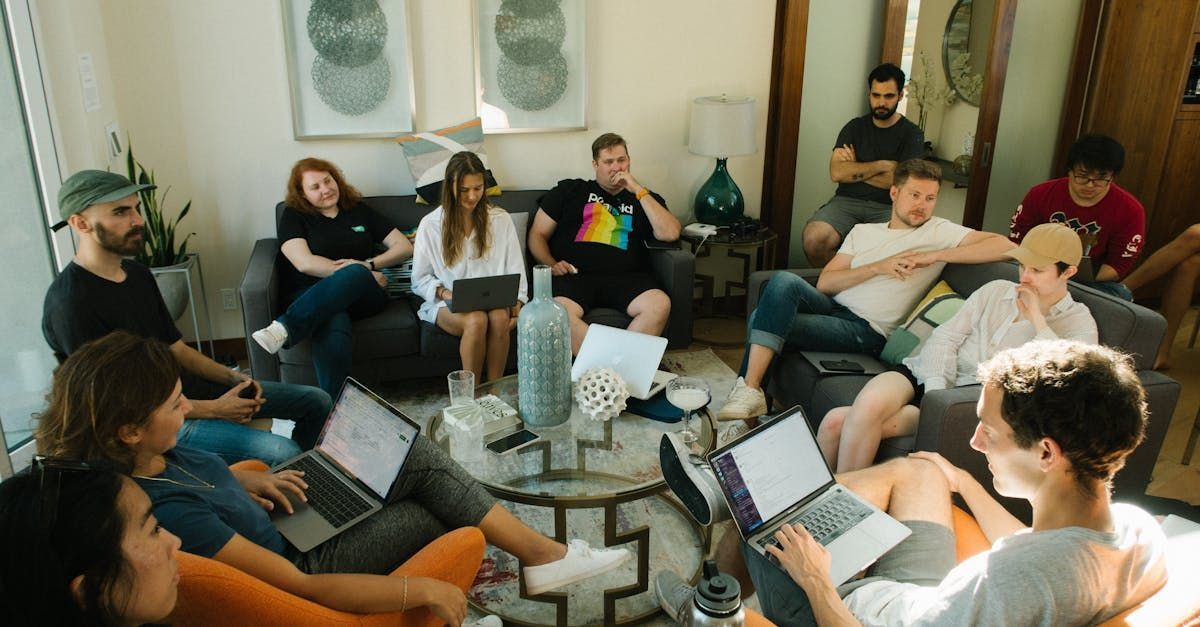Blog

We are honored to receive this recognition for our participation in the Ciencia Puerto Rico Scientist Service Online! In November, we presented the topic of Design Thinking and its application innovation and STEM disciplines. We had an overwhelming attendance and positive reviews of the session. The session is available (in Spanish) in the Ciencia PR YouTube channe l . Want to learn more about Design Thinking? Contact us!

¿Qué hace un mentor? Un mentor es alguien que ayuda a otros a logras sus metas. Un mentor sirve como un modelo a seguir. Esta persona comparte su conocimiento, experiencias, destrezas, y sus conexiones profesionales para ayudar a otros a logras sus metas profesionales y personales. Un mentor motiva e inspira a otros para que sean los futuros líderes y para que mejoren sus destrezas y habilidades. Tener un mentor te puede ayudar a aprender un tema más rápidamente, mejorar tu desarrollo profesional, subir tu nivel de confianza en el trabajo o la escuela, y expandir tus oportunidades profesionales. ¿Qué es mentoría? Mentoría es una actividad de aprendizaje que es voluntaria y recíproca. Tener un mentor requiere dedicación de parte de el mentor y de el aprendiz. Mentoría conlleva tiempo y esfuerzo de ambos para aprender una técnica nueva, buscar soluciones a un problema, y compartir conocimiento. Un mentor puede discutir varios temas dependiendo de su área de experiencia. Es responsabilidad de el mentor, proveer un espacio seguro para que la persona pueda investigar y experimentar nuevas ideas y conocimiento con confianza y sin miedo a fracasar. Mentores no dictan que la otra persona debe de hacer. Al contrario, ellos ofrecen su opinión y aconsejan a el aprendiz sobre la mejor manera de hacer algo o dónde pueden conseguir recursos que le van a ayudar. Aunque los mentores transfieren su conocimiento con otros, y pueden recomendar clases o cursos, el conocimiento se transfiere a la otra persona una manera más casual e informal que si se tomara una clase. Para que una relación de mentoría sea exitosa, ambas personas deben de sentirse cómodas durante la conversación y establecer los objetivos que se desean conseguir como para de la relación de mentoría. Tipos de mentoría Las relaciones de mentoría pueden ser formales o informales. Durante mentoría formal, el aprendiz identifica los objetivos que desea obtener durante la relación de mentoría, la persona trabajará con el mentor para hacer y ejecutar un plan que lleve a la persona a completar sus metas. Este tipo de relación por lo general es de duración corta con fecha de inicio y fin. Una vez el aprendiz completa sus objetivos, ya puede trabajar independiente de el mentor. Sin embargo, hay otras relaciones de mentoría que son informales y por lo general tienen más duración. Algunas son las relaciones de mentoría que surgen entre colegas en el trabajo, un maestro y un estudiante, un supervisor y el empleado, padres e hijos, o amistades. En este tipo de relación de mentoría la persona por lo general buscar ayuda con una destreza en específico. Los beneficios de tener un mentor Hay muchos beneficios para el aprendiz y el mentor como parte de la relación de mentoría. Aquí hay algunos de los beneficios: Ganar más seguridad y confianza con un tema o destreza Aprender nuevas destrezas y técnicas Expandir tus conexiones sociales Obtener una perspectiva diferente Mejorar tus técnicas de pensamiento crítico y de resolver problemas Mejorar tus destrezas de liderazgo Aprender recursos nuevos y cómo utilizarlos ¿Estás listo para tener un mentor? Envíanos un email y reserve tu primera sesión de mentoría gratis (sin compromiso alguno) para discutir tus metas y como podemos ayudarte.

What is a Mentor? A mentor is someone who can guide you to achieve your goals. Anyone can benefit both personally and professionally from having a mentor. A mentor serves as a role model sharing knowledge, expertise, insights, lessons learned, resources, and best practices to guide you in your path to success. They also share their professional network to increase your opportunities. Mentors motivate and inspire others, develop future leaders and work to improve your skills and abilities. Mentors help build and expand others’ abilities and skills. A mentor can help you increase your work performance, shorten your learning curve, boost your morale, and expand your career horizons, opportunities, and networks. What is (and is not) Mentoring? Mentoring is a voluntary and reciprocal learning activity that requires dedication and commitment both from the mentor and the learner. It is a time intensive and recurring activity that allows both parties to learn, solve problems by finding solutions that are feasible, and share knowledge. The mentoring relationship may cover a variety of topics. Good mentors provide an environment of physiological safety for the learner and helps learners investigate and execute ideas with confidence. Mentoring is an active endeavor where both parties need to commit time and effort to be achieve the desired results. Mentors do not direct others. Instead, they will provide their advice, opinions, and guidance for the learner to decide what works best for them. Although mentors will transfer some of their skills and knowledge with the learners, and they may recommend training, the learning happens in an more informal setting and organically as part of the idea and problem solving exploration. Mentoring is not a “one size fits all” approach. Both mentors and learners need to feel comfortable with the topics to be discussed and the expected goals and outcomes. Typically, once the learner achieves their goals, they will be able to perform independently and the mentoring relationship will no longer be needed. It is possible to have multiple mentors at different stages of someone’s career depending on the skills needed and the goals to be achieved. Learners are encouraged to leverage the strengths of the mentor to achieve their specific goals. Types of Mentoring Mentoring relationships can be formal or informal. In formal mentoring relationships, the learner identifies the objectives they will like to accomplish and will work with the mentor on a plan to achieve their goals. Formal mentoring relationships typically have a start and end date for the engagement. On the other hand, there is informal mentoring. Informal mentoring relationships can be between the learner with a co-worker, supervisor, teacher, friend or a parent. This type of relationship is more casual and the learner is just seeking guidance with a specific skill or knowledge gap. The Benefits of Mentoring There are many benefits of having a mentor. Here are some of them: Gain confidence and increase your morale Learn new skills and techniques Increase your network Gain a different perspective Improve your critical thinking and problem-solving skills Improve your leadership aptitude Learn new resources and how to use them Are you ready for mentoring? Send us an email to book a free mentoring session to discuss your needs and how we can help you!

Welcome to Skillscale LLC. We are a women-owned small business committed to empower the next generation of professionals and technical leaders. We provide Scaled Agile Framework (SAFe) training and certifications in the various agile roles, mentoring on STEM topics, Systems Engineering, and Agile methodologies, and consulting services. Subscribe to our mailing list today, and schedule your first mentoring session for free! ________ Bienvenidos a Skillscale LLC. Somos una pequena compania comprometida a empoderar a lo proxima generacion de lideres tecnicos y profesionales. Proveemos adiestramiento y certificaciones de Scaled Agile Framework (SAFe), servicios de mentoria en STEM, Ingenieria de Sistemas, y metodos de Agile. En adicion, proveemos servicios de consultoria. Subscríbete hoy para que recibas nuestras comunicaciones y reserva tu primera sesión de mentoría gratis.





